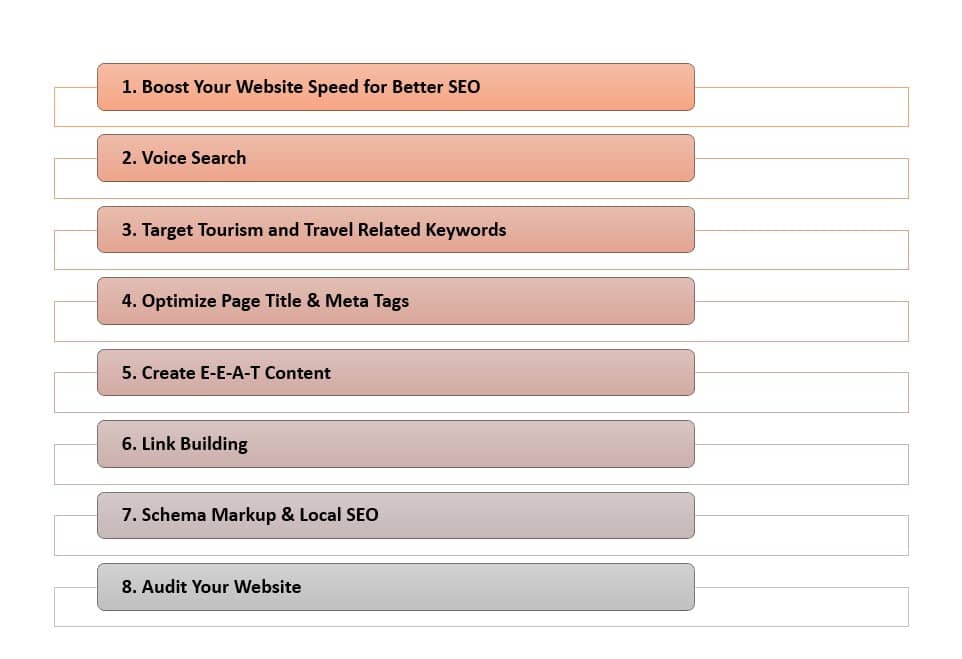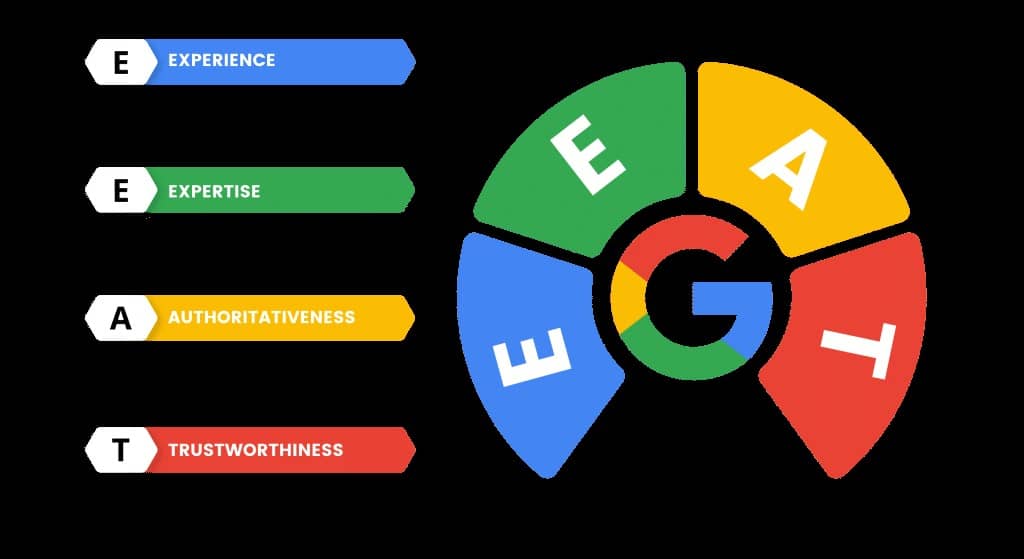Last Updated on August 26, 2024 by Admin
SEO for a travel website can increase not only traffic but also engagement, conversions, and, lastly, ROI (return on investment). However, being careless with your travel SEO will have far-reaching consequences for your overall SERP ranking.
The travel website will only be able to occupy that top position in the SERP for the intended keywords when the travelers are searching. Then, they will consider your website, blog, podcast, video, and other material.
In this blog, we’ve listed a few of the best SEO strategies for travel sites. As a professional SEO agency, we focus on ethical approaches and refuse to use black hat techniques.
Why Is Travel SEO Important?
Travel SEO is necessary for every travel business to increase its online presence, attract customers, and boost sales figures. By optimizing your travel site for search engines, you can increase the likelihood of your site showing up on the first page of the search results for the relevant keywords and phrases.
This makes it easier for more users to find your site, which can lead to higher engagement rates and potentially higher conversion rates. Travel SEO provides an advantage in a highly competitive travel industry, where many businesses compete for the attention of travelers. It is the differentiator that makes your website unique.
With a well-rounded Travel SEO strategy, you can position your travel business as an authority in your segment and cultivate trust in your target group, leading to the growth of your customer base.
SEO Factors That Impact the Travel Industry
Organic search algorithms are affected by the ranking factors that affect how travel industry content is rated. These six are the most crucial.
Keep in mind that algorithms are not static. They continue to enhance over time and become smarter. Sometimes, this happens with the tiniest of changes—hence, you might need to refresh the content or rewrite it.

1. Content Relevance
Your website should promise quality content and deliver SEO-optimized content. It is the same as when you are looking for A, but instead, you give your big sales pitch and the only thing that is not A. Therefore, the user will go away. Google will consider your content irrelevant to the search phrase and will, consequently, deprioritize you.
2. Images
The quantity of images, the relevance of the images, and the way they boost the content writing are some of the factors to look at. Finally, you should notice the way those images are labeled.
3. Outgoing and Incoming Links
We have two beneficial links—internal and external. The vast sites with a high number of pages do this by providing links where it is logical. Links should ideally be outbound to authority sites with higher authority ranking than the search engine.
4. Inbound Linking
Backlinks from other sites to your pages, especially sites with domain authority, are valuable. The importance of a link-building strategy in an SEO strategy is unquestionable.
5. Lists
Lists that are either bulleted or numbered and used in articles are an excellent way of making the articles more readable. They can also help your content grab the featured snippet positions. Of course, provided they are relevant, they are the most appreciated content by search engines.
6. Word Count
Suitable content marketing is one requirement for proper word count. Long articles are most likely to be related to the topic and authoritative. This magazine’s most viewed posts are approximately 2000-3000 words. However, this is also related to the main subject matter; you may be adding unnecessary words, which increases the risk of posting irrelevant content.
8 Tried-and-Tested Tips to Optimize Your Travel Website for SEO
We have just covered the most influential factors that affect Travel SEO. Now, it’s time to explore eight effective steps to boost your travel website’s search engine rankings. These tips will assist you in creating a site that ranks high in the search results and provides a wonderful experience for your visitors.
1. Boost Your Website Speed for Better SEO
Page load time is crucial for Travel SEO because it directly affects users’ experience and search engine ranking. A website that is slow to load may produce a high bounce rate, less engagement, and lower search engine ranking. To optimize your page load time:

- Measure the speed of your website with the help of tools like Google PageSpeed Insights or GTMetrix.
- Compress images and select the correct file formats (JPEG for photos and PNG for graphs) to make them lighter.
- Minify CSS, JavaScript, and HTML files to reduce size and improve loading time performance.
- Let the user’s device store the most often accessed files locally in the browser’s cache.
- Apply a content delivery network (CDN) to distribute your content across multiple servers, lowering the distance between your website and the user.
2. Voice Search
With voice assistants like Google Assistant, Siri, and Alexa taking center stage, it is inevitable that voice search becomes a top trend in Travel SEO, and hence, optimizing your travel website for voice search will boost your SEO game. To optimize for voice search:
- Make content that solves the problems that travelers straightforwardly face in your industry.
- Include long-tail keywords and natural language patterns in your content to match how people speak when using voice search.
- Integrate schema markup on your site so search engines can understand the semantics of your content properly.
- Optimize your site for local SEO by ensuring it contains your business name, address, and phone number (NAP) and is listed on the local directories.
3. Target Tourism and Travel Related Keywords
Keyword research is the base of any travel SEO strategy and can be considered successful. To make the audience to your travel site reach your target audience, you should be able to use keywords pertinent to your niche and have a high search volume. To conduct effective keyword research:
- List the keywords related to your travel products (destinations, attractions, activities, accommodation).
- Use keyword research tools like Google Keyword Planner, SEMrush, or Ahrefs to know search volume, competition level, and relevance.
- Long-tail keywords that are precise for the niche and have lower competition should be the main target.
- Suppose you consider the search intent behind each keyword (informational, navigational, or commercial) and make content that aligns with the user’s intent. In that case, you have a better chance to rank higher.
4. Optimize Page Title & Meta Tags
Page titles & meta tags are essential in Travel SEO because they are the first things users see when they use search engines. To optimize your page titles & meta descriptions:
- Keep page titles short and appropriate, and include your target keyword.
- Try composing a page title to be 50-60 characters long.
- Write a short and exciting meta description (150-160 characters) that briefly summarizes your page’s content.
- Persuade readers with your words and your descriptions’ clear call to action.
- Make sure to assign each page of your site a unique page title and meta description.
5. Create E-E-A-T Content
In Travel SEO, the content must show Expertise, Experience, Authoritativeness, and Trustworthiness (E-E-A-T). This is a great parameter for search engines to rank the content. To create E-E-A-T content:

Expertise:
- Tell everybody about your wide range of travel experiences.
- Develop content that authentically reflects the experience and research you have had.
- Make sure there are author bios that draw attention to your team’s qualifications and experience.
Experience:
- Tell your own story and share a narrative about your niche travel area.
- Give insider advice and suggestions from a firsthand’s point of view.
- The use of storytelling methods will not only make your content more interesting but also help you emotionally connect with the reader.
- Incorporate customer testimonials and ratings to support experience.
Authoritativeness:
- Develop partnerships with other credible websites in the travel industry and gain backlinks from them.
- Include a list of reliable sources within the main body of your content.
- Cooperate with like-minded influencers who are leading experts in your field.
- Participate in industry events and conferences to demonstrate your presence and credibility to the potential buyers of your product or service.
Trustworthiness:
- Provide accurate, up-to-date information.
- Display clientele reviews and testimonials.
- Be sure to implement HTTPS security and provide a privacy policy and terms of service.
- Be open about your business operations and provide information about any affiliations with brands or sponsored content.
6. Link Building
Building links is a major part of Travel SEO because it enables the platforms to develop the site’s trust and credibility in search engines’ eyes. To build quality backlinks:
- Create high-value, shareable content that would earn links from other websites.
- Contact bloggers, influencers, or other websites for guest posting or cooperation in your specialty.
- Make sure to emphasize quality rather than quantity when establishing links.
- Stay away from spammy link-building techniques
7. Schema Markup & Local SEO
Marking up schema and optimizing for local SEO may play an important role in climbing the ranks of search result pages. To leverage schema markup and local SEO:
Schema Markup:
- Schema markup your site to help search engines grasp more information about your business, like (location, contact details, and customer reviews).
- Utilize schema markup to display rich snippets in search results, improve your website’s visibility, and increase click-through rates.
Local SEO:
- Ensure your organization is classified on Google My Business and other local directories.
- Incorporate your location information in both your website content and the metadata.
- Invite clients to rate your company on their Google My Business listings.
- Make your website offer local search terms optimized for local searches.
8. Audit Your Website
Regular website audits are vital for the continued success of online marketing strategies for tourism. To audit your website effectively:
- Conduct technical audits of your website’s pages, content, and overall SEO performance.
- Adopt tools such as Google Search Console, SEMrush, or Ahrefs to identify areas for optimization improvement.
- Repair technical problems (broken links, duplicated content, loading pages slowly).
- Identify the weaknesses in your content strategy and stay on course with the most relevant keywords.
- Monitor your website’s backlink profile and discard any such links that appear low in quality or spammy.
- Evaluate your website’s user experience and make fixes as you go along.
Conclusion
Travel SEO is a great marketing tool for travel businesses. It is designed to increase their online presence, attract more qualified customers, and eventually generate more bookings.
Travel SEO is a continuing process that requires constant work and dedication. The rewards of hard work are greater organic traffic, enhanced engagement rates, and more conversions; which are worth the effort.
At AlgoSaga SEO marketing agency, we have particular expertise in search engine optimization and digital marketing for the travel industry to help them achieve their online objectives. Reach out to us now to know how we can help you take your travel SEO to a new level.
